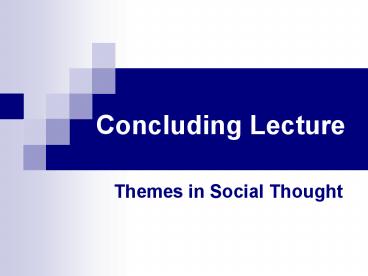Concluding Lecture PowerPoint PPT Presentation
1 / 16
Title: Concluding Lecture
1
Concluding Lecture
- Themes in Social Thought
2
Themes from the first class
- the problem of order
- the process of social change
- the function of conflict
- the practice of sociology
- the question of value freedom vs. value commitment
3
Who was most concerned about order?
- Durkheim
- concepts of
- anomie
- forms of solidarity
- collective conscience
4
Who was most concerned about order?
- Spencer
- more subtle
- laissez-faire approach
- Martineau
- concern for social order tempered by concern for
social justice
5
Social Change
- Marx
- view from the underside
- saw social order as oppressive
- revolutionary change was needed
- Weber and Durkheim
- view of change as gradual, orderly
6
Social Change
- Webb
- Fabian socialist
- change could come through democratic government
- Addams
- also had reformist view
- not a socialist
7
Function of Conflict
- Durkheim, Spencer, Martineau
- opposed to conflict
- Weber
- no explicit position
- Addams
- wary of confrontations
8
Function of Conflict
- Simmel
- could resolve divergent dualisms
- Marx
- would bring about needed change
- Webb
- did not rule out confrontation
- (e.g., in trade unions)
9
The practice of sociology
- Marx
- aimed at bettering the human condition
- Martineau, Webb, and Addams
- also saw their work as alleviating social
problems
10
The practice of sociology
- Du Bois
- change-oriented, especially with regard to race
- Marianne Weber and Gilman
- change-oriented, especially with regard to gender
11
The practice of sociology
- Durkheim and Spencer
- more detached
- insisted on objectivity
- Max Weber
- advocated value-freedom
- Simmel
- ambiguous
- somewhat criticalbut not strongly
12
Summary of core ideas
- Human beings are best
- understood as social beings
- Cannot survive without society
- Learn at an early age how to interact within
their particular society
13
Summary of core ideas
- 2. Society is more than a collection of
individuals - Interaction produces structures
- People then have to deal with those structures
- Social reality goes beyond individual motivations
14
Summary of core ideas
- 3. Structures are not necessarily
- permanent or stable
- For order theorists, the structures must be
maintained - For conflict theorists they may be changed
- In either case, social structures are seen as
humanly created
15
Summary of core ideas
- 4. Despite the complexities
- involved in studying societies,
- it is still possible, and necessary,
- to study human social reality
- in a careful and disciplined manner
- that integrates theorizing
- with empirical observation.
16
In addition . . .
- Some early theorists were
- concerned about social justice.
- This was an important dimension
- in the development of social theory
- that has not completely vanished.
- Theme for 2006 ASA meeting
- Is another world possible?

